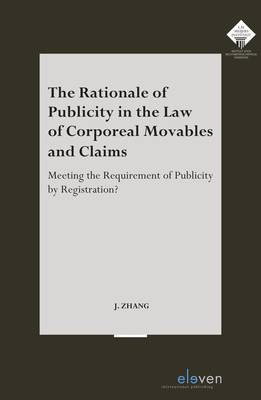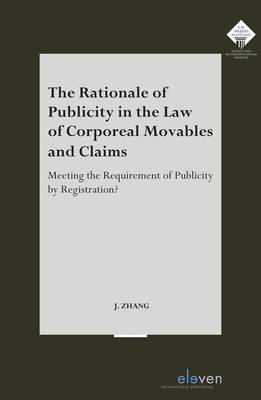
- Retrait gratuit dans votre magasin Club
- 7.000.000 titres dans notre catalogue
- Payer en toute sécurité
- Toujours un magasin près de chez vous
- Retrait gratuit dans votre magasin Club
- 7.000.0000 titres dans notre catalogue
- Payer en toute sécurité
- Toujours un magasin près de chez vous


The Rationale of Publicity in the Law of Corporeal Movables and Claims
Meeting the Requirement of Publicity by Registration? Volume 366
Jing Zhang
129,50 €
+ 259 points
Description
In modern society, movables have become an important part of one's wealth. The transactions concerning movables have noticeably become ever more complicated, implying that the legal relationships of personal property are considerably intricate. Under this pretext the question arises how to preclude conflicts for different transactions to realize the target of 'preventive justice' under a strong publicity system.
This book focuses on the traditional aspects of publicity, possession and notification with respect to corporeal movables and claims, and includes a comparative study of English law, German law and Dutch law. The principle of publicity on the basis of possession and notification is nowadays no longer tenable. Instead it is more desirable to introduce registration, traditionally a method of publicity for immovable property, in the law of corporeal movables and claims. In three case studies, this book argues that a system should incorporate secured transactions and trust, and an independent central register should be established as is the case for other jurisdictions.Spécifications
Parties prenantes
- Auteur(s) :
- Editeur:
Contenu
- Nombre de pages :
- 588
- Langue:
- Anglais
- Collection :
- Tome:
- n° 366
Caractéristiques
- EAN:
- 9789462362109
- Date de parution :
- 07-05-21
- Format:
- Livre broché
- Format numérique:
- Trade paperback (VS)
- Dimensions :
- 158 mm x 242 mm
- Poids :
- 934 g

Les avis
Nous publions uniquement les avis qui respectent les conditions requises. Consultez nos conditions pour les avis.







